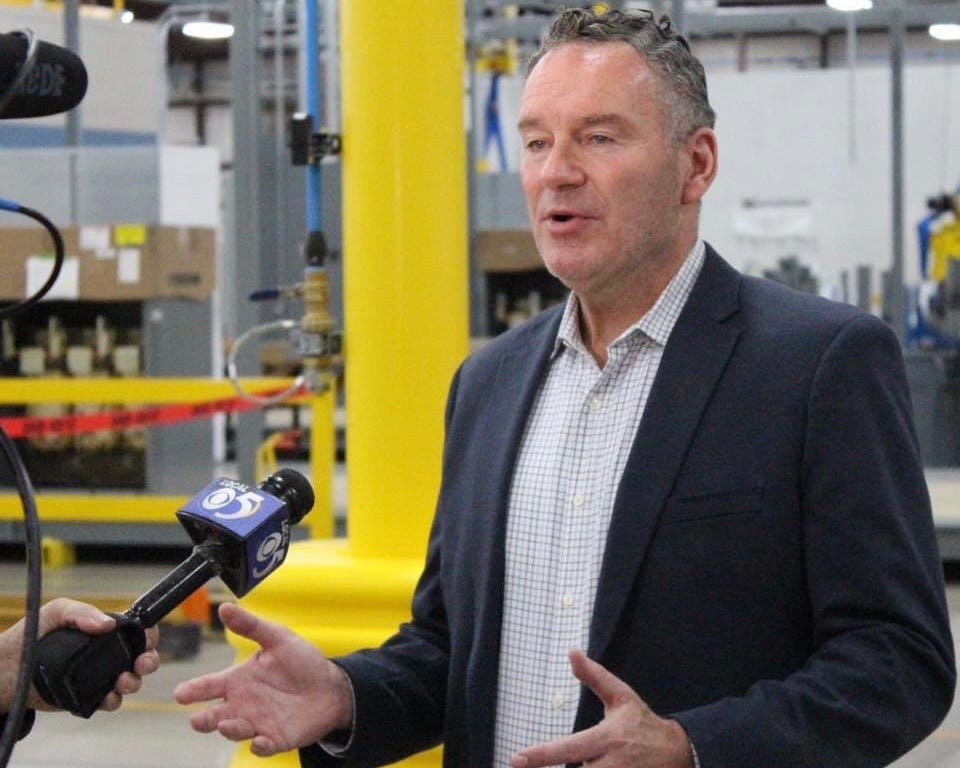The Recombobulation Area is a six-time Milwaukee Press Club award-winning weekly opinion column and online publication written and published by veteran Milwaukee journalist Dan Shafer. Learn more about it here.

shell game (n.)
1: thimblerig played especially with three walnut shells
2: Fraud, especially : a swindle involving the substitution of something of little or no value for a valuable item
In an earlier post for The Recombobulation Area, we referred to the enactment of a flat tax — a policy idea that Republican gubernatorial candidate Tim Michels has indicated he supports — as a “shell game.”
Our reference to this species of confidence trick was deliberate. In the classic version of the shell game, the confidence man convinces his customer that the pea must be under one of the walnut shells when he is in fact using sleight of hand to either move or hide the pea. The customer never stands a chance.
By stating that he supports a flat tax, but never engaging with the reality of what such a policy would entail, Michels is performing the same sort of parlor trick.
The purpose of our post was to walk out what some of the implications of various flat-tax proposals might look like, using a recent analysis prepared by the nonpartisan Wisconsin Legislative Fiscal Bureau. It’s important to note that this LFB analysis did not emerge out of thin air; it follows Michels’ early October comments at a campaign event, where the Republican candidate spoke positively about seeking to enact a flat tax in Wisconsin. Several other publications have also covered his initial comments on a flat tax and economists’ analysis of the LFB report, some characterizing this as a proposal. The conservative Badger Institute, for example, immediately applauded Michels’ comments, characterizing what he said as something he was “proposing.”
At no point has The Recombobulation Area characterized this as an official proposal from the Michels campaign. We have instead been critical of the campaign’s lack of details surrounding a pledge for “massive tax reform,” said during the only gubernatorial debate. The campaign has not answered questions about what the details of the candidate's proposal would be. This left us with no choice but to use available information to draw reasoned conclusions about the important policy tradeoffs implicated by a flat tax of the sort Michels says he supports.
Walking through the implications of this Michels-supported policy is especially important because, as we note in the post, it will remain in Michels’ interest to dissemble rather than to clarify which policies he supports. If history is any guide, this is how proposals to redistribute wealth upward tend to succeed.
We doubt that any of this really eluded Patrick Gleason, vice president of state affairs at Americans for Tax Reform, who wrote in Forbes that we make “false assertions” about an “imaginary” tax proposal. His organization –and its leader, Grover Norquist, who also attacked our analysis with wild mischaracterizations – has been instrumental in promoting the idea of flattening income taxes since the 1990s. And, with the recent wave of flat-tax enactments in states like Kentucky and Idaho, he no doubt views the prospect of unified Republican government as a moment of opportunity for bringing the ATR gospel to the Badger State. Otherwise, why bother complaining in Forbes about an analysis by a pair of academics in a fairly niche independent online newsletter? (Why, for that matter, bother emailing us a long list of requests for comment long after the close of business for a story with a deadline of 6 a.m. CDT in order to portray us as unresponsive? But we digress.)
Gleason is well aware that our Recombobulation Area post is less an attempt at “mind reading,” as he says, than an effort to shine light on the discussion of a type of policy reform that is easier to pass when the details remain in the shadows. The point is not to paint Michels as supporting a policy which he does not support, but to force him to confront the tradeoffs implicated by an idea for which he has signaled support while failing to provide clarity regarding what his plan might be.
One place to begin the discussion, as we do, is by asking the question of whether Michels could flatten the Wisconsin income tax without creating a significant budget gap? The answer, the Fiscal Bureau’s analysis suggests, is yes, but it would require tax increases for most filers in the state. We can conclude from this that flattening the code while lowering rates won’t be as simple as “sitting down with all the smart tax people,” as Michels suggests. Rather, it will require some very significant political tradeoffs.
Now, as we clearly note in our post, Michels has said he would not support raising taxes on anyone. Fair enough. Yet, our post shows that this would mean a flat tax with a rate of 3.54%, which is the rate that currently applies to the lowest tax bracket in the state. Absent hiking regressive sales or property taxes, this would result in a massive drain on state revenue, necessitating cuts in a number of important state programs.
Our post provided some sense of the scale of these cuts by. The appropriate question for the candidate who supports such a tax to confront, then, is which programs would he like to cut? And by how much? Alternatively, what would be his approach to raising general purpose revenues from other sources? These are all answerable questions, even if the answers prove unpopular or difficult to defend. But if Mr. Michels does not wish to address them, perhaps he should have stayed in the C-Suite.
Michels’ strategy until now has been one of studied ambiguity. When important policy issues are at stake, we think that does voters a disservice.
Yet one question that naturally arises when a candidate has been willfully vague about an important policy position is how analysts and reporters should respond to that ambiguity. Is it Mr. Gleason’s view that it is irresponsible to have a sharper conversation about the meaning of those positions? Or should we wait with bated breath for Michels to be clearer about who the winners and losers would be under his leadership?
In any case, we wish we did not have to do this kind of evidence-informed speculation concerning how policy ideas — especially those supported by a candidate for the most powerful office in the state — might play out if adopted. In a healthy democracy, a candidate might make it obvious which kinds of initiatives he supports and the tradeoffs they would entail. But, as we have already said, obfuscation is arguably the most important tool in the flat-tax arsenal.
And as any observer of Wisconsin politics surely knows, the state of democracy here is anything but healthy.
Phil Rocco is an associate professor of political science at Marquette University.
Sam Harshner is a visiting assistant professor in history and political science at Marquette University
Subscribe to The Recombobulation newsletter here and follow us on Facebook and Instagramat @therecombobulationarea.
Follow Dan Shafer on Twitter at @DanRShafer.





